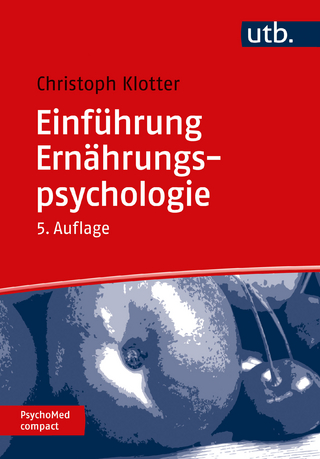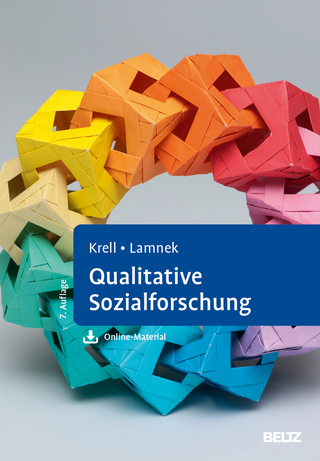
Routledge International Handbook of Self-Control in Health and Well-Being
Routledge (Verlag)
978-1-138-12386-1 (ISBN)
The ability to prioritise long-term goals above short-term gratifications is crucial to living a healthy and happy life. We are bombarded with temptations, whether from fast-food or faster technologies, but the psychological capacity to manage our lives within such a challenging environment has far-reaching implications for the well-being not only of the individual, but also society as a whole.
The Routledge International Handbook of Self-Control in Health and Wellbeing is the first comprehensive handbook to map this burgeoning area of research by applying it to health outcomes and personal well-being. Including contributions from leading scholars worldwide, the book incorporates new research findings that suggest that simply inhibiting our immediate impulses isn’t the whole story; there may be more options to improve self-control than simply by suppressing the ego.
Divided into six coherent sections, the book provides an overview of the research base before discussing a range of interventions to help improve self-control in different contexts, from smoking or drinking too much to developing self-control over aggression or spending money. The only definitive handbook on this far-reaching topic, this essential work will appeal to researchers and students across health and social psychology, as well as related health sciences.
Denise de Ridder received her Ph.D. in psychology from Utrecht University in 1991. Her research interests focus on self-regulation processes in health and consumer behavior, in particular how people deal with immediate temptations that may threaten their long-term goals. Marieke Adriaanse received her Ph.D. in psychology from Utrecht University in 2010. Her research is concerned with the interplay between conscious and nonconscious processes on health behavior. For example, she investigates how people react when they are confronted with nonconsciously activated behavior, as well as the potential of overruling such automatic behaviors (habits) through the use of self-regulation strategies. Kentaro Fujita received his A.B. summa cum laude in psychology from Harvard College in 2000, and his Ph.D. in psychology from New York University in 2006. His research interests focus on why despite possessing remarkable intelligence and reasoning capacity people often make decisions and behave in ways that undermine their valued goals and objectives.
1. Introduction
Part I. Conceptualizing Self-Control
2. Attentional and motivational mechanisms of self-control
Marina Milyavskaya & Michael Inzlicht
3. Proactive and reactive self-control
Asael Sklar, So Yon Rim, & Kentaro Fujita
4. Positioning self-control in a dual-systems framework
Marleen Gillebaart & Denise de Ridder
5. The use of reward cue reactivity in predicting real-world self-control failure
Dylan D. Wagner
Part II. Assessing Self-Control
6. Ego-depletion, self-control tasks, and the sequential task paradigm in health behavior
Martin S. Hagger & Nikos L. D. Chatzisarantis
7. Measurement of self-control by self-report: Considerations and recommendations
Rick H. Hoyle & Erin K. Davisson
8. The health consequences of intertemporal preferences
Oleg Urminsky & Gal Zauberman
9. Assessing self-control: The use and usefulness of the experience-sampling method
Simone Dohle & Wilhelm Hofmann
10. The neuroscience of self-control
Elliot T. Berkman
Part III. Antecedents and Consequences of Self-Control
11. What limits self-control? A motivated effort-allocation account
Daniel C. Molden, Chin Ming Hui, & Abigail A. Scholer
12. Implicit theories about willpower and their implications for health and well-being
Katharina Bernecker & Veronika Job
13. Working memory capacity and self-control
Wilhelm Hofmann
14. Combatting temptation to promote health and well-being
Ayelet Fishbach & Kaitlin Woolley
15. Broadening mental horizons to resist temptation: Construal level and self-control
David Kalkstein, Kentaro Fujita, & Yaacov Trope
16. The sense of agency in health and well-being: Understanding the role of the minimal self in action control
Robert A. Renes & Henk Aarts
17. Justification as antecedent and consequence of self-control failure
Marieke A. Adriaanse & Sosja Prinsen
18. Hyperopia: A theory of reverse self-control
Ran Kivetz, Rachel Meng, & Daniel He
Part IV. Self-Control Applications to Health
19. The self-control of eating behavior
Traci Mann & Mary E. Panos
20. Self-control and alcohol consumption
Jeffrey M. Osgood & Mark Muraven
21. Desire, higher-order sexual health goals and self-control in sexual behavior and sexual risk
John B. F. de Wit, Chantal den Daas, & Philippe C.G. Adam
22. Self-control and physical activity: Disentangling the pathways to health
Emely de Vet & Kirsten T. Verkooijen
23. The role of self-control in sleep behavior
Sanne Nauts & Floor M. Kroese
24. Self-control in smoking cessation
Arie Dijkstra
Part V. Self-Control Applications to Wellbeing
25. Emotion regulation and self-control: Implications for health and wellbeing
Catharine Evers
26. Self-regulation and aggression: Aggression-provoking cues, individual differences, and self-control strategies
Jaap Denissen, Sander Thomaes, & Brad J. Bushman
27. Examining the role of self-regulatory strength in family violence
Catrin Finkenauer, Asuman Buyukcan-Tetik, Kim Schoemaker, Yayouk E. Willems, Meike Bartels, & Roy F. Baumeister
28. The effects of managing discrimination experiences on self-control, health, and well-being
Dorainne J. Levy & Jennifer A. Richeson
29. Self-distancing: Basic mechanisms and clinical implications
Özlem Ayduk & Ethan Kross
30. Self-control in consumer spending decisions
Kelly L. Haws
31. How self-control promotes health through relationships
Michelle R. vanDellen, LeeAnn B. Beam, & Gráinne M. Fitzsimons
Part VI. Improving Self-Control in Health and Wellbeing
32. A Meta-analysis of improving self-control with practice
Joanne R. Beames, Timothy P. Schofield, & Thomas F. Denson
33. Health behavior change by self-regulation of goal pursuit: Mental contrasting and implementation intentions
Gabriele Oettingen & Peter M. Gollwitzer
34. Mindfulness as an intervention to improve self-control
Malte Friese, Brian Ostafin, & David D. Loschelder
35. How to foster health and well-being when self-control is low
Bob M. Fennis
36. Training cognitive-motivational processes underlying self-control in addiction
Reinout W. Wiers & Helle Larsen
37. The nudging approach to health and wellbeing
David R. Marchiori & Marijn Stok
38. Exploiting exposure to temptation to support self-control
Siegfried Dewitte
39. Self-affirmation and self-control: Counteracting defensive processing of health information and facilitating health behavior change
Guido M. van Koningsbruggen, Eleanor Miles, & Peter R. Harris
| Erscheinungsdatum | 30.01.2018 |
|---|---|
| Reihe/Serie | Routledge International Handbooks |
| Zusatzinfo | 6 Tables, black and white; 16 Line drawings, black and white; 2 Halftones, black and white |
| Verlagsort | London |
| Sprache | englisch |
| Maße | 174 x 246 mm |
| Gewicht | 1043 g |
| Themenwelt | Geisteswissenschaften ► Psychologie ► Sozialpsychologie |
| Medizin / Pharmazie | |
| ISBN-10 | 1-138-12386-2 / 1138123862 |
| ISBN-13 | 978-1-138-12386-1 / 9781138123861 |
| Zustand | Neuware |
| Informationen gemäß Produktsicherheitsverordnung (GPSR) | |
| Haben Sie eine Frage zum Produkt? |
aus dem Bereich


